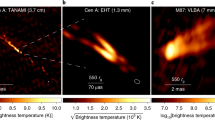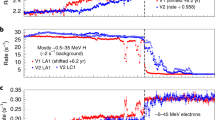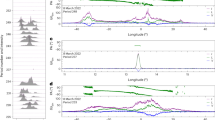Abstract
A RECENT investigation by Bigg1 has shown that the recording of decameter wave-length radiation from Jupiter depends not only on the Jovian longitude which faces the Earth but also on the relative position of the satellite Io in its orbit. Since the decameter bursts are probably associated with the magnetic field of the planet, I decided to see if Io had any effect on the synchrotron emission generated within the radiation belts in Jupiter's magnetosphere.
This is a preview of subscription content, access via your institution
Access options
Subscribe to this journal
Receive 51 print issues and online access
$199.00 per year
only $3.90 per issue
Buy this article
- Purchase on Springer Link
- Instant access to full article PDF
Prices may be subject to local taxes which are calculated during checkout
Similar content being viewed by others
References
Bigg, E. K., Nature, 203, 1008 (1964).
Haddock, F. T., and Dickel, J. R., Trans. Amer. Geophys. Union, 44, 886 (1963).
Dickel, J. R., thesis, University of Michigan (1964).
Author information
Authors and Affiliations
Rights and permissions
About this article
Cite this article
DICKEL, J. Lack of Effect of Io on Jovian 3.75-cm Emission. Nature 206, 1241–1242 (1965). https://doi.org/10.1038/2061241b0
Issue Date:
DOI: https://doi.org/10.1038/2061241b0
Comments
By submitting a comment you agree to abide by our Terms and Community Guidelines. If you find something abusive or that does not comply with our terms or guidelines please flag it as inappropriate.



